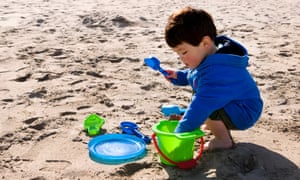Too much cleanliness not bad for health, report on hygiene says

The notion that too much cleanliness can be bad for your health and that children need to be exposed to germs is a dangerous myth, according to a public health body.
The Royal Society for Public Health (RSPH) said the hygiene hypothesis – that allergies are caused by too much cleanliness, by killing off the bugs we need to challenge our immune systems – has entered the public imagination and is being misinterpreted.
Playing outside in the dirt will certainly do children good by exposing them to good bacteria, the RSPH stressed, but it was vital that they washed their hands before eating and after going to the toilet.
“The time has come when we need to sort this one out,” said Sally Bloomfield, the honorary professor at the London School of Hygiene and Tropical Medicine, who is lead author of a report called Too Clean or Not Too Clean. “The public is becoming very confused.”
Two out of five people in a survey wrongly thought children’s mucky hands after playing outdoors would spread germs. Grubbing around outside and playing with animals was important for building a robust immune system, the study said, but cleanliness still really mattered when people were preparing food and before eating it.
At a time when antibiotic resistance is on the rise and the NHS is under pressure, it is more important than ever to try to stop infections, says the report. Around one in four people get an infectious intestinal disease every year and one in 20 pick up norovirus, the vomiting bug, it says. Adults get four to six colds every year and children pick up six to eight. The report said hand washing and hygiene could stop the spread.
In the survey, however, 23% of 2,000 people agreed that “hygiene in the home is not important because children need to be exposed to harmful germs to build their immune system”.
Men were more likely than women to think that hygiene was not vital. They were more than twice as likely as women to think there was low or no risk associated with not washing hands with soap after using the toilet (16% vs 7%) or after handling raw meat (8% vs 4%).
The RSPH is calling for “targeted hygiene”. Washing the floor does not matter that much, it says. Nor it is important to spend time cleaning inside the toilet bowl – flushing gets rid of the germs. But it is important to clean food preparation surfaces and wash dishcloths.
Most crucial to breaking the chain of transmission of dangerous pathogens is hand washing – after visiting the toilet, after playing with or caring for pets, before and after preparing food and after coughing, sneezing or nose-blowing, said the report.
“Food poisoning shot up in the 1980s and 1990s and the Food Standards Agency did a lot of work, but levels of gastrointestinal diseases remain at unacceptable levels,” said Bloomfield. “It is the same thing with respiratory diseases. We’re always at risk of a flu pandemic. If such a thing occurred the public would always be the first line of defence until a vaccine can be put in place.”
The RSPH said children should be taught in school about how infection occurred and about targeted hygiene. “This should embed best practice of hygiene from an early age and promote consistent understanding of the terminology used to talk about hygiene and hygiene issues,” read the report. It also called for education for the media “to help ensure they do not give confusing and counter-productive messages”.
[“source=theguardian”]



